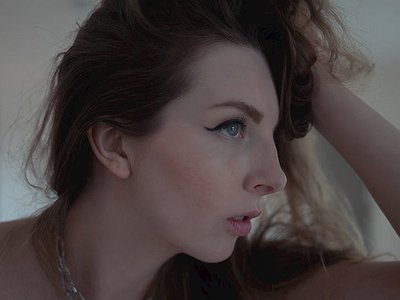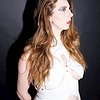Part 1
Name: Megan Mitchell aka Cruel Diagonals
Nationality: American
Current release: Megan Mitchell's new release as Cruel Diagonals, Fractured Whole, is out via Beacon Sound.
Recommendations: Meshes of the Afternoon by Maya Deren; ...The Men Parted the Sea to Devour the Water by The Haxan Cloak
If you enjoyed this Cruel Diagonals interview and would like to stay up to date with her music, visit her official website. She is also on Instagram, Facebook, Soundcloud, and twitter.
When did you start writing/producing/playing music and what or who were your early passions and influences? What was it about music and/or sound that drew you to it?
It was obvious from a pretty young age that I had musical inclinations and that singing was going to be very important to me. My mom has told me that I used to hum myself to sleep as a baby, so my singing voice has seemingly always been the most natural way of soothing and expressing myself.
I was fortunate enough to have parents who encouraged my musical growth, despite neither of them being artists themselves. My parents enrolled me in voice lessons at age 11, and a bit later I started with guitar and piano. I was also heavily involved in musical theater, opera, jazz solo and choir performances, and vocal competitions.
I began writing songs around age 13. At the time, I truly believed I wanted to be a pop country singer, but fortunately had older friends who exposed me to alternative music, like Radiohead, Jeff Buckley, and CAN during my freshman year of high school. Radiohead’s Amnesiac was particularly formative for me and ended up leading me to all kinds of experimental music that are part of my go-to repertoire now. I remember reading about how musique concrète and 20th century experimentalists were huge influences on that album’s production style, which led me down all sorts of YouTube rabbit holes.
For a number of years, I was interested in post-punk, no wave, and coldwave, as well as krautrock, which eventually led me back again to early electronic music. I was hugely influenced by Pauline Oliveros, Luc Ferrari, Dariush Dolat-Shahi, Éliane Radigue and Anne Gillis in particular when I first started making the music that would end up being Cruel Diagonals.
[Read our Pauline Oliveros interview]
This project started seriously for me in 2016, and in more recent times, I’ve been incorporating more of my past experiences, such as theater and dance, into this project as well.
When I listen to music, I see shapes, objects and colours. What happens in your body when you're listening and how does it influence your approach to creativity?
For me, music is the strongest means of communicating emotions.
When I allow myself to be immersed in a song as opposed to having it passively exist in the same space as me, I experience a sensation of being overcome and enveloped by it. I feel a sensation in my chest and abdomen, particularly when the music is devastatingly sad (my favorite kind!), of heaviness and groundedness. It feels as though I’m anchored into the earth and am connected to something larger than myself.
This is why sad music is particularly important to me, and almost feels like a sacred ritual when I really allow myself to listen to it on headphones or lying down on the floor.
How would you describe your development as an artist in terms of interests and challenges, searching for a personal voice, as well as breakthroughs?
My development has truly just been an exercise in realizing I’m wholly capable of producing ideas and seeing them all the way through, but deciding at a certain point that I’d rather dedicate my energy to areas in which I am strongest.
One challenge has been to relinquish control, by allowing other people to contribute or help with aspects of the creative process that I don’t have as much patience for, such as mixing, mastering, and design. There is so much vulnerability in the process of presenting your work to someone and essentially asking for their input and validation.
When I was a younger artist, I was pretty terrified of other people’s inputs along the way, because that meant I might never feel brave enough to release my material if I received a critique that I couldn’t address on my own. As I grew more confident in my skill set and started to be able to incorporate feedback from people I trusted, this became a vital part of the creative process.
Being able to gracefully accept critique has definitely been a huge breakthrough, though it will probably always be tricky. Putting yourself out into the world as an artist requires doing a lot of emotional work and unpacking things as they arise. Sometimes I have to step away from it to just rest and gestate for a while, which I’ve also realized is a critical part of the process.
Tell me a bit about your sense of identity and how it influences both your preferences as a listener and your creativity as an artist, please.
I’m a deeply sensitive and emotional person, which has always kind of been at the core of my creative expression. That sensitivity has fueled a pretty intense and serious approach to my art, which I think comes across in the way that it sounds. It’s very dark and brooding and beautiful, full of dichotomies, bursts of noise, and cascading, ethereal passages.
These are all very much indicative of my inner world, where I’ve experienced a lot of turmoil and struggles with anxiety, depression and trauma. So I do and have always gravitated toward dark, intense, emotional music and art. I don’t like flashy or overly aggressive music. I much prefer intentionality, finesse, and dynamics as a listener as opposed to viscerally loud music.
I also deeply identify as a leftist, feminist, and general deviant and outsider, so this side of my personality can often contrast heavily with my more sensitive side. I think people are often surprised that I’m brash, goofy, and outspoken if they’ve only encountered my art and not my personality first and foremost.
I definitely adhere to ethics pretty heavily with my listening habits and my perception of an artist is colored by what they represent in their design, lyrics, or public statements.
What, would you say, are the key ideas behind your approach to music and art?
I’m always approaching my art from the desire to represent the rawest, and most foundational emotions. I’m never interested in trendiness or fitting in to a specific genre or social circle.
I make everything in earnest and wear my heart on my sleeve, sometimes to a fault. It’s the only way I know how to be.
How would you describe your views on topics like originality and innovation versus perfection and timelessness in music? Are you interested in a “music of the future” or “continuing a tradition”?
I believe true originality is impossible. I can strive to experiment, reinterpret, and blend ideas, but I can never pretend to be wholly futuristic or unique in what I do.
I do hope to create something that has a timeless quality to it, in that it speaks to a more core, visceral experience, and that it won’t feel terribly trendy or dated later on.
Over the course of your development, what have been your most important instruments and tools - and what are the most promising strategies for working with them?
My voice and the computer are invaluable to me, and are, at this point, my only two instruments.
Maintaining my vocal health has proved to be a bit challenging; I’m not sure if it’s because of the pollution where I live or some underlying issue, but my voice tires more easily now, and I can’t really sing in my chest voice anymore. I’ve had to adapt to this, by recording slowly, and by singing somewhat sparingly in a specific range when performing.
Since my voice is so important to my sound, I hope to preserve it and find healthy outlets to use it. Perhaps this will drive me to sing in different ways that will sound totally different from how I used it before.






